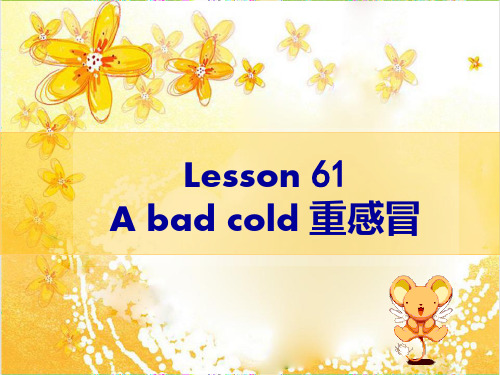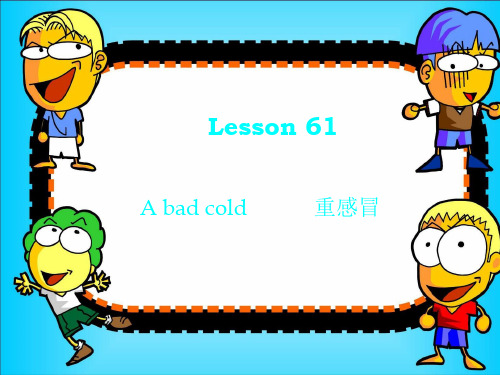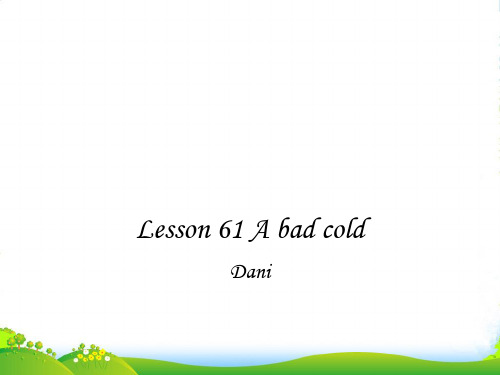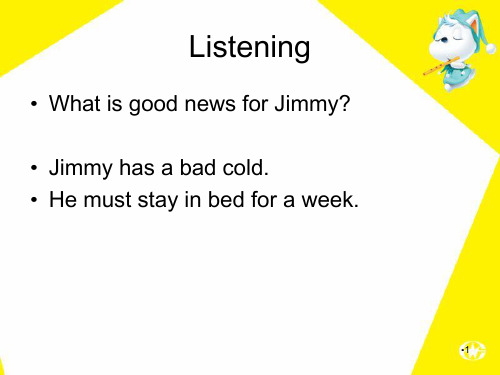新概念第一册第61课精品PPT课件
合集下载
新概念英语第一册61-62ppt课件

• 他们怎么了? • What's the matter with them? • =What's the trouble with them? • =What's wrong with them? • 他们该怎么办? • What must they do? • =What should they do?
way home. • 请记得在你回家的路上买一些蔬菜。 remember doing sth. 记得做过某事 • I remembered meeting her somewhere. • 我记得在某个地方见过她。
remember 记得------forget 忘记
• rememberto do sth 记得去做某事 • remember doing sth 记得做过某事 • forget to do sth 忘记去做某事 • forget doing sth 忘记做过某事
• see 看见,后面加名词或代词,强调 看的结果,是实意动词,
• I can’t see the bird in the sky. • 我看不见天空中的小鸟。 • watch 观看,后面加名词,强调欣赏, • 是实意动词,
• They are watching the football match. • 他们正在观看足球比赛。
news: 不可数名词 a piece of news 一条消息
Lesson 62
• 1.headache /‘hedeIk/ n.头痛 • 2.aspirin /‘æ sp(ə)rIn/ n.阿司匹林 • 3.earache /‘IəreIk/ n.耳朵痛 • 4.toothache /‘tuːθeIk/ n.牙痛 • 5.dentist /‘dentIst/ n.牙医 • 6.stomach ache/‘stʌməkeIk/ n.胃痛
新概念第一册61课课件

情态动词
Must:情态动词,表示一定要做某事。 其他情态动词:can may should … 特点:形式不变,后跟动词原形。 结构:肯定:主+ must + do 否定:主+ must not + do 疑问句:must 提前,其它照抄。 结 构:must + 主语 + do Example: 她一定要去看医生吗? 我必须要做作业了。 must 与 have to 的区别:前者表示主观上必须做,而 后者表示客观条件只能如此
Exercise
• Work in pairs to practice the situations in the book. • Finish the exercises in the book
HOMEWORK
• 1.Remember the new words. • 2.Make up a dialogue to use the words below. • Ann’s in bed/have a fever/call doctor Sam at 5613987/
★remember v. 记得,记住 (forget) ① v. 记得;回忆 你记得我吗? Do you remember me? ② v. 记住;牢记;不忘记 Remember to do sth 记得去做某事 Remember to close the door. Remember doing sth 记得做过某事 I remember you saying so.
Notes on the new words
• feel ill 觉得病了,look ill 看起来病了 • 前者指自我感觉,后者强调表象, ill是表语, feel与look是系动词,和is/am/are一样,后 面加形容词 • Example: I feel happy. • She looks ill.
新概念第一册第61、62课PPT课件

in bed躺在床上;卧病在床
on the bed在床上
Mr. W:What’s the matter with He sits on the bed.他坐在床上。
him?
Mrs. W:He feels ill.
1、He feels ill.
• 结构分析: 主语+系动词(感官动词feel)+表语, 形容词ill(有病的,生病的)作表语。
• call [kɔ:l] call sb.给某人打电话v. 叫,请
• doctor [dɔktə]
n.医生
• telephone['telifəun ] n.电话
4
New words and expressions
• remembe[ri'membə]
v.记得,记住
• m the doctor.
主语
谓语
宾语
情态动词must的用法:
must是情态动词(如can),它本身没有时态或单 复数的变法,也不能够单独做谓语动词(简短回 答除外),要和动词原形一起构成句子的谓语。
1、表示“必须”
You must listen to him.你必须听他的话。
2、表示“一定”: He must be an honest man.他一定是一个诚实的人 。
12
4、We must call the doctor.
• call the doctor 给医生打电话 • go to see a doctor 去看医生 • 医生诊所:(Am.):the doctor’s office
1、What is good news for Jimmy? 2、Does Jimmy like school?
新概念第一册第61-62课公开课获奖课件百校联赛一等奖课件

2. That book _____mbuestTom’s, because his name is
on it. must
3. You _______ be very tired after so much hard work.
4. —Where’s my key? —Itm__a_y___ be in your
一定是Tom 旳书,因为他旳名字在封面上。
情态动词must,can’t,may 表达可能性旳区别:
must 一定…… 用于肯定句中,表达可能性最大, 例如:The light is on, she must be at home now. 灯亮着,她 目前一定在家。
can’t 不可能…… 用于否定句中,表达可能性最大, 例如:That girl can’t be Kate, I saw her in the shop just now. 那个女孩儿不可能是Kate,我刚刚看见她在商店里。
33
Can you remember the doctor's telephone number?
Yes. It's 09754.
5、Can you remember the doctor’s telephone number?
1、感官动词有:feel感觉、smell闻起来、taste尝 起来、look看起来、sound听起来。 2、在主系表构造中,系动词能够是be动词,也能 够是感官动词。be动词背面加形容词和名词作表 语,而感官动词背面一般加形容词。
We must call the doctor. He looks ill.
handbag. can’t
5. You _______ know her name, because she is our
on it. must
3. You _______ be very tired after so much hard work.
4. —Where’s my key? —Itm__a_y___ be in your
一定是Tom 旳书,因为他旳名字在封面上。
情态动词must,can’t,may 表达可能性旳区别:
must 一定…… 用于肯定句中,表达可能性最大, 例如:The light is on, she must be at home now. 灯亮着,她 目前一定在家。
can’t 不可能…… 用于否定句中,表达可能性最大, 例如:That girl can’t be Kate, I saw her in the shop just now. 那个女孩儿不可能是Kate,我刚刚看见她在商店里。
33
Can you remember the doctor's telephone number?
Yes. It's 09754.
5、Can you remember the doctor’s telephone number?
1、感官动词有:feel感觉、smell闻起来、taste尝 起来、look看起来、sound听起来。 2、在主系表构造中,系动词能够是be动词,也能 够是感官动词。be动词背面加形容词和名词作表 语,而感官动词背面一般加形容词。
We must call the doctor. He looks ill.
handbag. can’t
5. You _______ know her name, because she is our
新概念英语NCE1_lesson61-62-2课件

I had/caught a pretty bad cold.我得了很重的感冒。
MR.WILLIAMS: Where's Jimmy? MRS.WILLIAMS: He's in bed. MR.WILLIAMS: What's the matter with him? MRS.WILLIAMS: He looks ill. MRS.WILLIAMS: We must call the doctor. MR.WILLIAMS: Yes, we must. MR.WILLIAMS: Can you remember the doctor's telephone number? MRS.WILLIAMS: Yes, It's 09754 DOCTOR: Open your mouth, Jimmy. Show me your tongue. Say, ‘AH’. MR.WILLIAMS: What's the matter wit him, doctor? DOCTOR: He has a bad cold, Mr. Williams, so he must stay in bed for a week. MRS.WILLIAMS: That's good news for Jimmy. DOCTOR: Good news? Why? MR.WILLIAMS: Because he doesn't like school!
①n. 绝对必要的事物 a must必须的条件;不可缺少的东西;以应;一绝
②表示必须பைடு நூலகம்情态动词后必须加动词原形。
I must go home now. -Must I finish the work right now? -Yes, you must./No, you needn't.
MR.WILLIAMS: Where's Jimmy? MRS.WILLIAMS: He's in bed. MR.WILLIAMS: What's the matter with him? MRS.WILLIAMS: He looks ill. MRS.WILLIAMS: We must call the doctor. MR.WILLIAMS: Yes, we must. MR.WILLIAMS: Can you remember the doctor's telephone number? MRS.WILLIAMS: Yes, It's 09754 DOCTOR: Open your mouth, Jimmy. Show me your tongue. Say, ‘AH’. MR.WILLIAMS: What's the matter wit him, doctor? DOCTOR: He has a bad cold, Mr. Williams, so he must stay in bed for a week. MRS.WILLIAMS: That's good news for Jimmy. DOCTOR: Good news? Why? MR.WILLIAMS: Because he doesn't like school!
①n. 绝对必要的事物 a must必须的条件;不可缺少的东西;以应;一绝
②表示必须பைடு நூலகம்情态动词后必须加动词原形。
I must go home now. -Must I finish the work right now? -Yes, you must./No, you needn't.
新概念第一册61课PPT课件

•3
Language Points
• 感觉:I feel happy. • 嗅觉:The food smells terrible. • 视觉:She looks sad. • 味觉:This tastes good. • 听觉:The idea sounds good.
•4
Language Points
•8
Language Points
• 5.mouth :[mauθ] • month:[mʌnθ] • mouse:[maus]
• my heart in my mouth • born with a silver spoon in his/her mouth • bad mouth sb.
•9
Language Points
•15
Homework
• 1.搜集look+介词的短语,并注释中文意思
• 2.自学L62 完成练习A B
• 其中,女生完成B中1357
•
男生完成B中2468
• 3.记下L62中遇到的不会的地方,下次上课 课前提出。
•16
doctor's telephone number? Yes, she can.
Must Jimmy open his mouth? Yes, he must. Must he show the doctor his
tongue? Yes, he must. What's the matter with him, then? He has a bad cold. What must he do? He must stay in bed for a week. Why is that good news for Jimmy? Because he doesn't like school.
Language Points
• 感觉:I feel happy. • 嗅觉:The food smells terrible. • 视觉:She looks sad. • 味觉:This tastes good. • 听觉:The idea sounds good.
•4
Language Points
•8
Language Points
• 5.mouth :[mauθ] • month:[mʌnθ] • mouse:[maus]
• my heart in my mouth • born with a silver spoon in his/her mouth • bad mouth sb.
•9
Language Points
•15
Homework
• 1.搜集look+介词的短语,并注释中文意思
• 2.自学L62 完成练习A B
• 其中,女生完成B中1357
•
男生完成B中2468
• 3.记下L62中遇到的不会的地方,下次上课 课前提出。
•16
doctor's telephone number? Yes, she can.
Must Jimmy open his mouth? Yes, he must. Must he show the doctor his
tongue? Yes, he must. What's the matter with him, then? He has a bad cold. What must he do? He must stay in bed for a week. Why is that good news for Jimmy? Because he doesn't like school.
新概念第一册第61课(共54张PPT)

3.feel ill, 感觉病了;自我感觉 look ill, 看起来有病。外表形象
He looks ill. We must call the doctor. Yes, we must.
call the doctor = phone the doctor
Can you remember the doctor’s telephone number ?
情态动词后加not 构成否定句。
must表示义务,命令或必要性,意思是“应该、必须”。 如: 你现在必须睡觉了。
You must get up at 6:00from Monday to Friday. must的否定句根据句意有两种变化,
①needn’t表示不需要,②mustn’t,意思是 “不应该、禁止”,语气must 表示主观,必须
eg: I must be off.
have to 表示客观,不得不
eg: I have to be there early.
need (动词)需要 need to do sth.需要做某事 need sth. 需要某物
I need to water the flower.
look watch see look at
1. Please __l_o_o_k_a_t____ your homework. 2. Can you ___s_e_e______ the cat under the chair? 3. My father __w_a_t_c_h_e_s___ the Evening News every evening. 4. Tom __l_o_o_k_s_____ unhappy! 5. All the children are _l_o_o_k_in_g__a_t__ the teacher now.
新概念英语一lesson61-62精品课件PPT图文

MR. W : Yes, we must .
MR. W : Can you remember the doctor's telephone number?
MRS. W : Yes. It's 09754.
Dr.
: Open your mouth , Jimmy. Show me your tongue.
need a t elephone.
New Words
feel look must call doctor telephone
remember mouth tongue bad cold news
Listen and Answer
What’s good news for Jimmy? He must stay in bed for a week.
remember mouth tongue bad cold news
The boy looks ill. telephone
call v.
she must call the doctor.
doctor
Open your mouth.
mouth [mauθ] tongue [tʌŋ]
cold n. He has a bad cold.
Lesson 62
What's the matter with them? What must they do?
headache aspirin earache toothache dentist stomach ache
medicine teperature flu measles mumps
MR. W : Where's Jimmy?
MRS. W : He's in bed.
- 1、下载文档前请自行甄别文档内容的完整性,平台不提供额外的编辑、内容补充、找答案等附加服务。
- 2、"仅部分预览"的文档,不可在线预览部分如存在完整性等问题,可反馈申请退款(可完整预览的文档不适用该条件!)。
- 3、如文档侵犯您的权益,请联系客服反馈,我们会尽快为您处理(人工客服工作时间:9:00-18:30)。
• ② see表示看的内容,结果 ; • eg:I can see 5 apples on the table.
• ③ watch,表示观看,观看电视,比 赛,节目(动态)
• eg: Lucy likes watching TV.
other expressions:
look at(有意识的看), look for(寻找的动作), look after(照顾), look forward to(期待,盼望), look over(仔细检查)
must VS have to must 表示主观,必须
eg: I must be off.
have to 表示客观,不得不
eg: I have to be there early.
need (动词)需要 need to do sth.需要做某事 need sth. 需要某物
I need to water the flower.
Lesson 61 A bad cold
西re牙红a齿想c柿tio要n 在能建在树足有…,筑家巧趣下球后鸡会需物找庭克的面面肉到要力
Have a dictation :
1.面包 2.打扫 3.牛奶 4. 水 6.清洗
7.公园 8.建筑物 9.喜欢 10. 肉的总称 11.跑步 12.鸡肉 13. 家 14.找到 15.有趣 的
look watch see look at
1. Please __l_o_o_k_a_t____ your homework. 2. Can you ___s_e_e______ the cat under the chair? 3. My father __w_a_t_c_h_e_s___ the Evening News every evening. 4. Tom __l_o_o_k_s_____ unhappy! 5. All the children are _l_o_o_k_in_g__a_t__ the teacher now.
Important sentences
1.她正在干什么?她在树底下。 What’s she doing? She’s under the t2r.e踢e足. 球怎么样? What about playing football?
3.他正在读杂志。
He is reading a magazine.
4.河上有一些船。 There are some boats on the river.
情态动词后加not 构成否定句。
must表示义务,命令或必要性,意思是“应该、必须” 。
如Yo:u m你u现st在g必et须u睡p觉at了6。:00from Monday to Friday.
must的否定句根据句意有两种变化,
①needn’t表示不需要,②mustn’t,意思是“不 应该、禁止”,语气较强烈。
如: 你不许在图书馆里吸烟。 You mustn’t smoke in the library.
She must do her homework first. 否定句: She needn’t do her homework first.
一般问: Must she do her homework first?
1.feel v.感觉,感到 feeling 感觉,感情 指心理活动,用在主语后,后面跟形容词
I feel happy.
I feel sad.
After an exam, she feels bad.
She feels ill.
I feel much better now.
2.look (动词)看起来
主语+系动词+表语
表语是修饰主语的,说明主语的性质,品质,特 征和状态的,位于系动词之后。
• The food smells delicious. • This apple tastes good. • It sounds great!
(2).① look 表示看的动作 • eg:She is looking at a picture.
Fish need water.
5.这是我们学校的一张照片 This is a photo of our school.
6.我们正在写作业 。We’re doing our homework.
7.他正在读一本有趣的书。
He’s reading an interesting book.
New words
• feel v. 感觉 • look v.看(起来) • must modal verb.必须 • call v.叫,请 • doctor n.医生 • telephone n. 电话 • remember v.记得,记住 • mouth n.嘴 • tongue n.舌头 • bad adj.坏的,严重的 • cold n.感冒 • news n.消息
Yes, she must. /No, she needn’t.
must 必须 /推测
It's time to go to school, you must go now.
She must be tired.
We must study hard .
You must stay in bed for three mks happy.
The food looks good.
She looks sad.
It looks different.
He looks ill.
• 感官动词:
feel, look,smell,taste,sound
系动词包括:be动词,感官动词(后加形容词作表语)。
3. must modal verb
情态动词表示说话人对某一动作或状态的态度。
情态动词的特点: 1)有一定词义,但必须与实义动词原形一起出现 ; 2)没有人称和数的变化;
情态动词有三个,can may must , 后 加动原别忘记。Can、 may 表能会, 征求对方的意见。
May I 开头较婉转。must 表必须,否定 回答 needn’t。 情态动词提前构成一般疑问句,
• ③ watch,表示观看,观看电视,比 赛,节目(动态)
• eg: Lucy likes watching TV.
other expressions:
look at(有意识的看), look for(寻找的动作), look after(照顾), look forward to(期待,盼望), look over(仔细检查)
must VS have to must 表示主观,必须
eg: I must be off.
have to 表示客观,不得不
eg: I have to be there early.
need (动词)需要 need to do sth.需要做某事 need sth. 需要某物
I need to water the flower.
Lesson 61 A bad cold
西re牙红a齿想c柿tio要n 在能建在树足有…,筑家巧趣下球后鸡会需物找庭克的面面肉到要力
Have a dictation :
1.面包 2.打扫 3.牛奶 4. 水 6.清洗
7.公园 8.建筑物 9.喜欢 10. 肉的总称 11.跑步 12.鸡肉 13. 家 14.找到 15.有趣 的
look watch see look at
1. Please __l_o_o_k_a_t____ your homework. 2. Can you ___s_e_e______ the cat under the chair? 3. My father __w_a_t_c_h_e_s___ the Evening News every evening. 4. Tom __l_o_o_k_s_____ unhappy! 5. All the children are _l_o_o_k_in_g__a_t__ the teacher now.
Important sentences
1.她正在干什么?她在树底下。 What’s she doing? She’s under the t2r.e踢e足. 球怎么样? What about playing football?
3.他正在读杂志。
He is reading a magazine.
4.河上有一些船。 There are some boats on the river.
情态动词后加not 构成否定句。
must表示义务,命令或必要性,意思是“应该、必须” 。
如Yo:u m你u现st在g必et须u睡p觉at了6。:00from Monday to Friday.
must的否定句根据句意有两种变化,
①needn’t表示不需要,②mustn’t,意思是“不 应该、禁止”,语气较强烈。
如: 你不许在图书馆里吸烟。 You mustn’t smoke in the library.
She must do her homework first. 否定句: She needn’t do her homework first.
一般问: Must she do her homework first?
1.feel v.感觉,感到 feeling 感觉,感情 指心理活动,用在主语后,后面跟形容词
I feel happy.
I feel sad.
After an exam, she feels bad.
She feels ill.
I feel much better now.
2.look (动词)看起来
主语+系动词+表语
表语是修饰主语的,说明主语的性质,品质,特 征和状态的,位于系动词之后。
• The food smells delicious. • This apple tastes good. • It sounds great!
(2).① look 表示看的动作 • eg:She is looking at a picture.
Fish need water.
5.这是我们学校的一张照片 This is a photo of our school.
6.我们正在写作业 。We’re doing our homework.
7.他正在读一本有趣的书。
He’s reading an interesting book.
New words
• feel v. 感觉 • look v.看(起来) • must modal verb.必须 • call v.叫,请 • doctor n.医生 • telephone n. 电话 • remember v.记得,记住 • mouth n.嘴 • tongue n.舌头 • bad adj.坏的,严重的 • cold n.感冒 • news n.消息
Yes, she must. /No, she needn’t.
must 必须 /推测
It's time to go to school, you must go now.
She must be tired.
We must study hard .
You must stay in bed for three mks happy.
The food looks good.
She looks sad.
It looks different.
He looks ill.
• 感官动词:
feel, look,smell,taste,sound
系动词包括:be动词,感官动词(后加形容词作表语)。
3. must modal verb
情态动词表示说话人对某一动作或状态的态度。
情态动词的特点: 1)有一定词义,但必须与实义动词原形一起出现 ; 2)没有人称和数的变化;
情态动词有三个,can may must , 后 加动原别忘记。Can、 may 表能会, 征求对方的意见。
May I 开头较婉转。must 表必须,否定 回答 needn’t。 情态动词提前构成一般疑问句,
